September 1 - 7, 2019: Issue 419
Peninsula Bridge Club
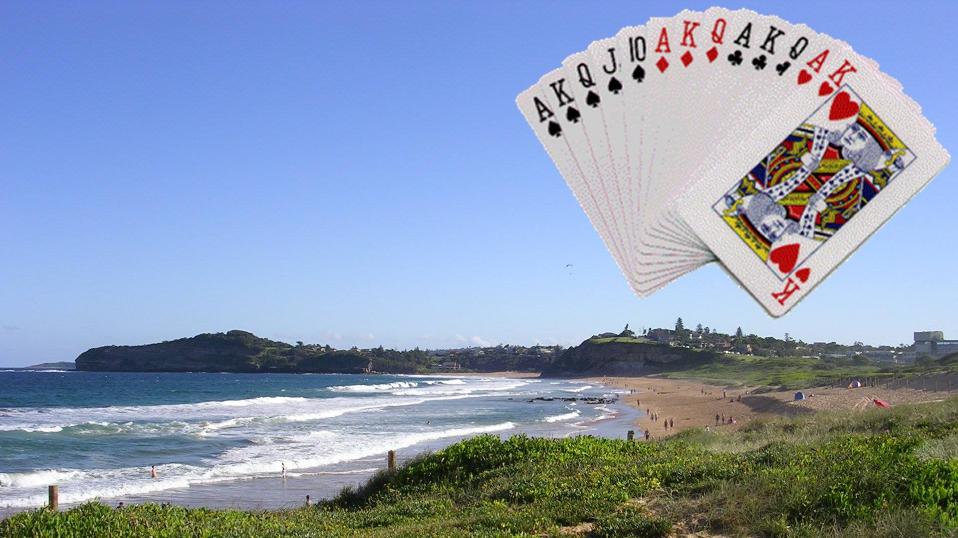
In recent weeks the great community spirit and contributions of members of the Peninsula Bridge club has received thanks from other local organisations, including the Mona Vale Hospital Auxiliary, local NSW Rural Bush Fire brigades and the Mona Vale Hospital Palliative Care volunteers.
Looking after others is not restricted to local organisations, visit:
These titbits point out that this is a great club and group of people focused on sharing social and competitive bridge playing opportunities and all that comes with that, as well as doing all they can for other local organisations and people far from here.
This week an insight into one of our community assets - our thanks to Cath Whiddon and Sarah Young for their input on placing this information together.
When and how did the Peninsula Bridge Club begin?
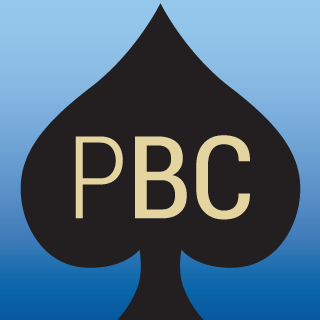 Founded in 1967, we are a key community hub on Sydney’s Northern Beaches. We contribute strongly to our community: with both social connectedness for those who need it and opportunities to learn and train for those with competitive sporting goals.
Founded in 1967, we are a key community hub on Sydney’s Northern Beaches. We contribute strongly to our community: with both social connectedness for those who need it and opportunities to learn and train for those with competitive sporting goals.
The Club is a vibrant organisation hosting up to three bridge sessions a day. We have 37 permanently set tables – that’s 148 players. We host over 30,000 player sessions every year. This includes prominent tournaments and education events attracting players from across the region.
We pride ourselves on the friendliness of the club and our strong community spirit. We support local charities but even more importantly we support community members by providing them with social connection and mental stimulus – irrespective of age and mobility.
We are a not-for-profit volunteer run association.
The Peninsula Bridge Club Inc is managed by a Committee comprised of four office-bearers and up to seven ordinary committee members.
The 2018/19 committee is comprised as follows:
President - Sarah Young
Vice President - David Farmer
Secretary - Susan Coleman
Treasurer - Bob Whiddon
Ordinary committee members - Trish Berry, Susan Eason, Bill Fitzsimons, Greg Hay, Gayle King, Cassandra Mitchell and Ken Watson.
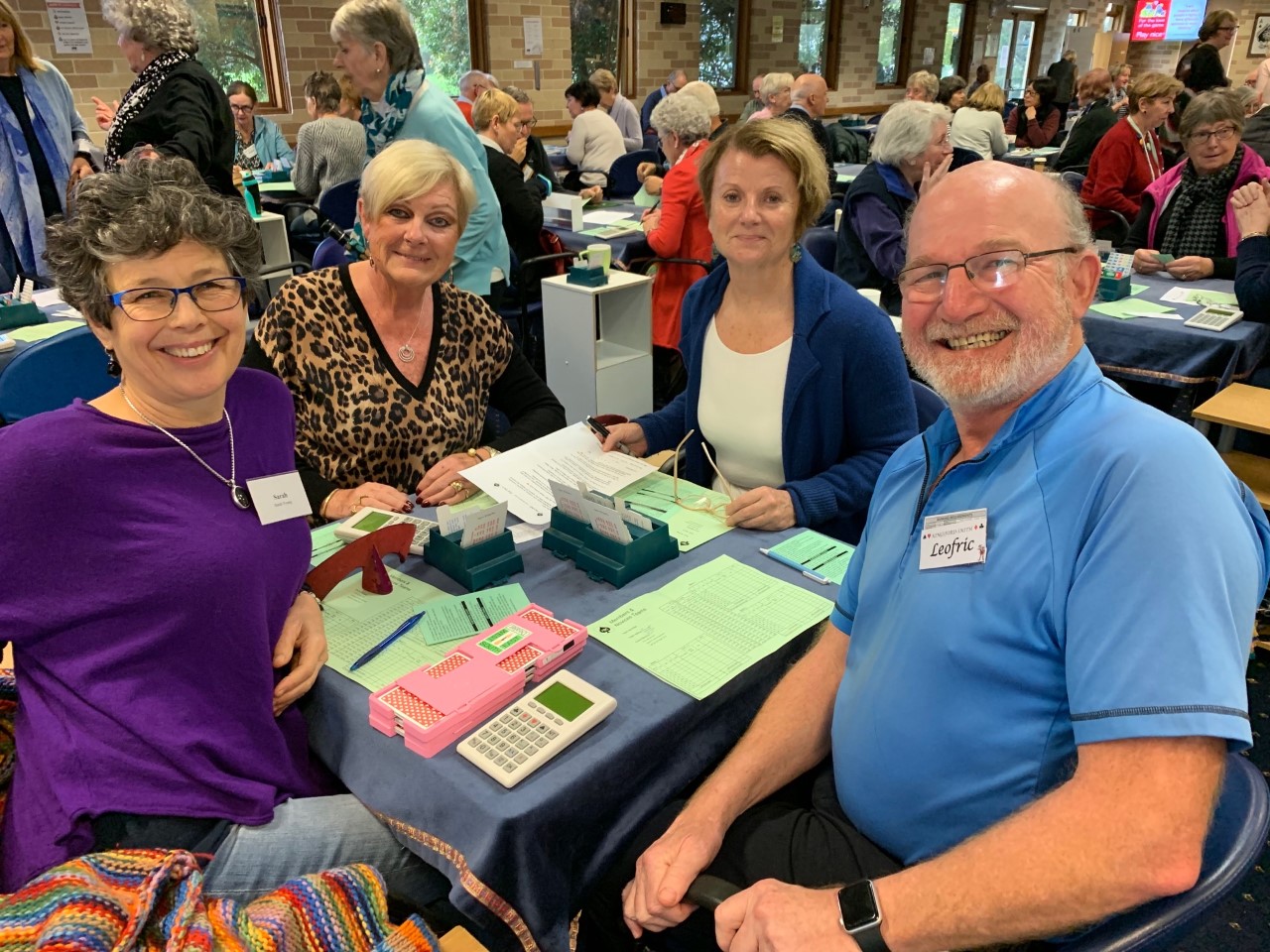
Our President Sarah Young enjoying a teams day with new members.
OUR PEOPLE
DIVERSITY
Some members have played for more than 60 years, others have just begun. One of our members learned bridge at the age of 88 and others when they were children! We are proud of 85+ year old members. We have both working and retired players. We support vulnerable groups within our community including the aged, less mobile and the physically infirm. “Living in aged care, bridge gives me contact with people with wit and conversation and is great for maintaining my mental capacity.”
MOBILITY
12% of our members have a Mobility Parking Permit. They value our ease of access and lots of parking. We cater for wheelchairs and walking frames. ‘I have severe health issues and am unable to participate in any of my previous hobbies/sports. Bridge has filled this gap for me.’
BRAIN BOOST
Bridge is the mind sport. We have an ABF accredited team which delivers focused learning programs for beginners to intermediates. “Bridge is gym for my mind”
SOCIAL
In a recent survey, 90% of our members stated that bridge was important to their weekly social contact. Bridge builds self-esteem and connectedness. “Bridge is the skeleton on which I hang the rest of my social life. I live alone so all of this is important to me.” “Bridge is my lifeline.” The club offers social interaction and mental stimulation – both particularly important for those redefining their lives no longer focused on children and work.
ENJOYMENT
Every bridge hand is a challenge and an adventure. “Bridge is fun.”
COMMUNITY CONTRIBUTION
The voluntary contributions of a large number of skilled individuals provide rich community benefits. “I feel part of a community. The way bridge players help and support each other both at the club and outside is quite refreshing.’’
VOLUNTEERS EVERYWHERE
We are a Not-for-Profit club with many opportunities for volunteering. Over 100 helpers make the club hum. Members not only donate their time but freely contribute their skills and experience. Our history of volunteering means a better and affordable bridge experience for our members and visitors. It is a rewarding experience for all those involved.
WHAT IS BRIDGE
Bridge is more than just a game and sport – it is a social network and a life-long learning journey.
Bridge, is a trick-taking card game using a standard 52-card deck. In its basic format, it is played by four players in two competing partnerships, with partners sitting opposite each other around a table.
The dominant variations of the game are rubber bridge, more common in social play; and duplicate bridge, which enables comparative scoring in tournament play. Each player is dealt thirteen cards from a standard 52-card deck. A trick starts when a player leads, i.e. plays the first card. The leader to the first trick is determined by the auction; the leader to each subsequent trick is the player who won the preceding trick. Each player, in a clockwise order, plays one card on the trick. Players must play a card of the same suit as the original card led, unless they have none (said to be "void"), in which case they may play any card.
The player who played the highest-ranked card wins the trick. Within a suit, the ace is ranked highest followed by the king, queen and jack and then the ten through to the two. In a deal where the auction has determined that there is no trump suit, the trick must be won by a card of the suit led. However, in a deal where there is a trump suit, cards of that suit are superior in rank to any of the cards of any other suit. If one or more players plays a trump to a trick when void in the suit led, the highest trump wins. For example, if the trump suit is spades and a player is void in the suit led and plays a spade card, he wins the trick if no other player plays a higher spade. If a trump suit is led, the usual rule for trick-taking applies.
Unlike its predecessor Whist, the goal of bridge is not simply to take the most tricks in a deal. Instead, the goal is to successfully estimate how many tricks one's partnership can take. To illustrate this, the simpler partnership trick-taking game of Spades has a similar mechanism: the usual trick-taking rules apply with the trump suit being spades, but in the beginning of the game, players bid or estimate how many tricks they can win, and the number of tricks bid by both players in a partnership are added. If a partnership takes at least that many number of tricks, they receive points for the round; otherwise, they receive penalty points.
Bridge extends the concept of bidding into an auction, where partnerships compete to take a contract, specifying how many tricks they will need to take in order to receive points, and also specifying the trump suit (or no trump, meaning that there will be no trump suit). Players take turns to call in a clockwise order: each player in turn either passes, doubles – which increases the penalties for not making the contract specified by the opposing partnership's last bid, but also increases the reward for making it – or redoubles, or states a contract that their partnership will adopt, which must be higher than the previous highest bid (if any). Eventually, the player who bid the highest contract – which is determined by the contract's level as well as the trump suit or no trump – wins the contract for their partnership.
If someone has an interest in Bridge but no understanding of the game, is there capacity to teach them so they may get involved?
Yes - below is the current info requested about upcoming lessons
We have a new Beginners Course starting the end of September.
Each 2-hour lesson focuses on learning by playing, with a break for tea and chocolate biscuits mid-way. The course runs for 6 weeks and costs $100, which includes text book and support materials.
After the lessons we offer “Help with Play” sessions to practise what you’ve learned; Mondays 7-9pm; Tuesdays 2.15-4.30; Fridays 9.15-11.30. ($7 for members & $12 for visitors – membership
We also offer more advanced lessons each month so you can continue to improve your game if you want.
If you are keen to learn this great game, please call or email Cath Whiddon (Director of Bridge Ed at PBC): 9979 5752 or cwhiddon@live.com.
If you already know how to play, take a look at our website to see what’s on offer this month: peninsulabridgeclub.org.au
Peninsula Bridge Club Facebook page: www.facebook.com/peninsulabridgeclub
We welcome new members. (Joining fee, including 1 year membership is $85.)
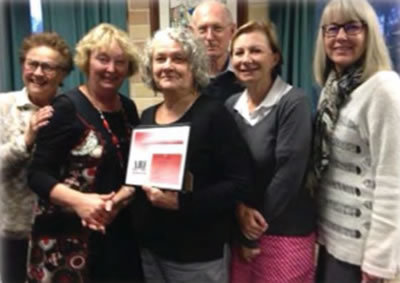
Australian Bridge Accredited Teachers
How often are the games and where do you meet?
We are a large friendly professional club offering twelve games a week as well as a range of lessons and special events for all players, both social and competitive, and new and experienced.
Our Clubhouse is located in the Nelson Heather Centre at 4 Jacksons Road Warriewood near the corner with Pittwater Road and just a few minutes walk from the Warriewood Square Shopping Centre. Buses, including the new B-Line, that run along Pittwater Rd from Mona Vale and the City stop very close to the Jacksons Road turn-off. Car parking within the grounds is free and accessed from Boondah Road (first turn right when entering Jacksons Road) but please notice that some spaces are reserved for Meal-on-Wheels volunteers during the day. Ample street parking is available nearby.
The clubhouse is a well appointed and purpose-built facility with reverse-cycle air conditioning and a fully equipped kitchen. We can comfortably accommodate up to 40 bridge tables with side-tables for drinks, bidding boxes etc. Tea, coffee and biscuits are provided free at all sessions but meals are not generally available.
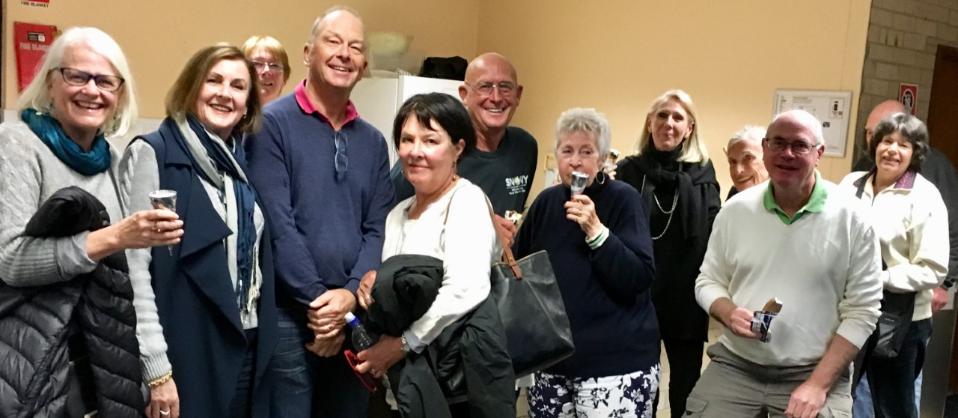
Some our newest players sharing an ice cream after their first competitive event (the Whiddon Cup).